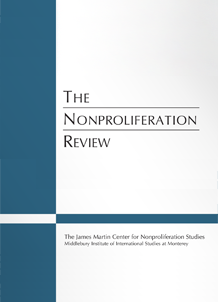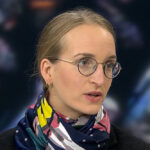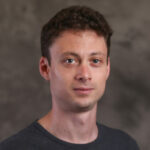September 11, 2025
An article providing key insights into Russian nuclear strategy during the first 18 months of the war in Ukraine has won the Doreen and Jim McElvany Nonproliferation Award’s grand prize, the Nonproliferation Review and the James Martin Center for Nonproliferation Studies announced today.
The article, “Russian nuclear roulette? Elites and public debates on nuclear weapons in Moscow after Ukraine” by Lydia Wachs, provides evidence against the view—widely expressed in the months after Russia launched its full-scale invasion of Ukraine in February 2022—that as Russian conventional capabilities deteriorated because of the war, Moscow’s reliance on nonstrategic nuclear weapons could grow. By analyzing Russian-language documents produced by several groups of Russian elites, Wachs found that, although there was an increase in nuclear discourse at all levels, the calls for a lowering of the nuclear threshold did not gain support from political and military decision makers.
One of the McElvany judges commended the article for serving as “a superb example of how open source intelligence can reveal important insights into Russian security issues.” A second judge praised it for “nicely challeng[ing] conventional wisdom while making good use of Russian-language source[s].”
Upon learning of the award, Wachs said, “I’m incredibly honored to receive this award—it means a lot to me that the article has been so well received. Writing it alongside my PhD was not always easy, which is why I’m truly grateful for the recognition.”
Another article on Russia received the runner-up prize. Karl Dewey’s “Poisonous affairs: Russia’s evolving use of poison in covert operations” explores the use of poison by the ruling regimes in the Soviet Union and later Russia. The foundation of the article is a dataset spanning nearly 100 years and comprising 134 cases that meet Dewey’s criteria for inclusion as poisonings. He classifies these events by their rationale and examines differences in patterns across different leadership periods, allowing him to establish a typology of use and highlight evolving trends.
Judges praised both the assembling of the dataset and the way Dewey told the story it revealed. One judge called the article “riveting,” with “logical, thorough and highly evidenced arguments.” They added that the piece “[d]id not over-claim but there was no need.”
Honorable mention went to Austin R. Cooper’s “The Argentella scandal: why French officials did not make Corsica a nuclear test site in 1960,” which recounts a little-known piece of nuclear history: The French government planned to conduct nuclear tests in an abandoned mine, the Argentella Massif, in Corsica, but it then abandoned those plans in 1960 in a matter of months in the face of local opposition. Cooper’s article argues that the controversy, resulting in the government’s about-face, raises questions about the accepted narrative of a firm consensus among French officials on the country’s nuclear-weapons policy and about other aspects of French nuclear history.
The article earned kudos from the judges for making good use of archival materials to tell a largely unfamiliar story while also “drawing out much bigger implications from the case,” as one judge put it. The article was republished in the volume Nuclear France: New Questions, New Sources, New Findings (ed. Benoît Pelopidas, 2024).
The prizes were awarded for Volumes 29-30 of the Nonproliferation Review. All the articles are Open Access, which means that they are freely available.
A panel of three nonproliferation experts—Jeffrey W. Knopf, Patricia Lewis, and Kathleen Vogel—selected the winners. Daniel Horner and Stephen Herzog of the Nonproliferation Review organized the panel and tallied the votes.
Horner and Herzog said, “These articles, which provided new information and challenged widely accepted narratives, epitomize the type of work we seek to publish in the Nonproliferation Review.” They added, “We thank the judges for taking the time to do their job so thoroughly and for making difficult choices among the eligible articles.”
About the Award
The James Martin Center for Nonproliferation Studies (CNS) and its journal, the Nonproliferation Review, aim to spur new thinking about nonproliferation and disarmament. To advance this goal, the Doreen and Jim McElvany Nonproliferation Award recognizes exceptional scholarly research, innovative ideas, and policy proposals published in the Nonproliferation Review.
All authors and co-authors of articles, viewpoints, and reports published in Volumes 29 and 30 of the Nonproliferation Review were eligible for the award except current employees of CNS and members of the journal’s editorial board.

About the Journal
The Nonproliferation Review is a refereed journal concerned with the causes, consequences, and control of the spread of nuclear, radiological, chemical, and biological weapons. It features theoretical analyses, historical studies, viewpoints, and book reviews on such issues as state-run weapons programs, treaties and export controls, safeguards, verification and compliance, disarmament, terrorism, and the economic and environmental effects of weapons proliferation.
The Nonproliferation Review is produced at the Washington, DC, offices of the James Martin Center for Nonproliferation Studies, Middlebury Institute of International Studies at Monterey. The journal is published by Taylor & Francis.



